George Jackson - I'm Gonna Wait (Hi 2212)
I'm Gonna Wait
George Jackson, in so many ways the pure essence of Southern Soul, has left us. I don't think you can say enough about this man's importance in the development of this music. Known primarily for his incredible songwriting skills, his career as a performer is often forgotten. This emotional gem we have here was released by Willie Mitchell as a B Side twice, once 1n 1967 and again in 1972... that's how good it is. You can feel George put his heart and soul on the line, just as he did with everything he touched. From Memphis and Muscle Shoals, to his longstanding position as the poet-laureate of Malaco Music, George Jackson's gentle genius defined what it meant to be a Soul Man.
He will never be replaced.
____________________________________________
There is an excellent overview of George's recording career over at Deep Soul Heaven, and re-printed below is an appreciation of him I wrote back in 2006:
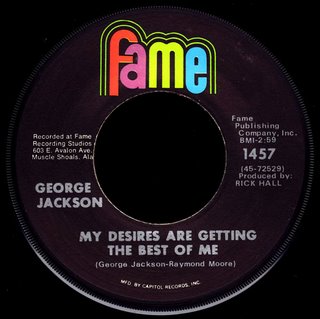
My Desires Are Getting The Best Of Me
As the final installment of our 'fame fest', I thought we'd focus on the quiet genius behind so much great southern soul, George Jackson.
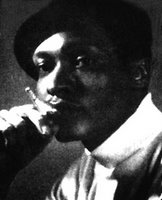 Born in B.B. King's Indianola, George grew up on the river in Greenville, Mississippi. When Ike Turner rumbled down Highway 61 from Clarksdale, the teenaged Jackson went to see him and showed him some of the songs he'd been writing. Ike was impressed, and brought George downriver to New Orleans to record at Cosimo Matassa's studio in 1963. His idol was Sam Cooke (as he was for most every other aspiring singer in those days), and the record they cut Won't Nobody Cha-Cha With Me was an attempt to cash in on the recent Cooke-inspired 'cha-cha' craze. Released on Turner's Prann label, the single sank like a stone.
Born in B.B. King's Indianola, George grew up on the river in Greenville, Mississippi. When Ike Turner rumbled down Highway 61 from Clarksdale, the teenaged Jackson went to see him and showed him some of the songs he'd been writing. Ike was impressed, and brought George downriver to New Orleans to record at Cosimo Matassa's studio in 1963. His idol was Sam Cooke (as he was for most every other aspiring singer in those days), and the record they cut Won't Nobody Cha-Cha With Me was an attempt to cash in on the recent Cooke-inspired 'cha-cha' craze. Released on Turner's Prann label, the single sank like a stone.Jackson next moved to Memphis, and placed a couple of novelty type singles with the Dot and Doro labels through local impresarios Dorothy and John Hester. Also around this time, he recorded under the first of many pseudonyms, Louie Palmer, for Earl Forrest's Bootheel label in 1965. George's best friend in Memphis, Dan Greer, soon became his songwriting partner, and they formed their own short-lived label, Gre-Jac the following year. The label's only release, You Didn't Know It But You Had Me, was by 'George & Greer', and didn't sell much.
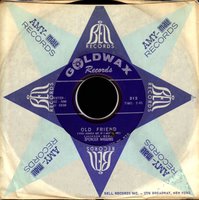 As legend has it, George lived in a big old house in Memphis and the landlady let him use her broken-down piano to write songs. He and Dan would spend most of every day working on material, and they were soon noticed by Quinton Claunch and 'Doc' Russell over at Goldwax Records. Claunch offered Jackson a contract as a songwriter for Goldwax, and one of the first tunes he contributed to the label, Old Friend (You Asked Me If I Miss Her) (Goldwax 312) became a local hit for the great Spencer Wiggins in 1966. In what was apparently part of the deal, Goldwax 313 was a re-release of the George & Greer single. It didn't sell this time either.
As legend has it, George lived in a big old house in Memphis and the landlady let him use her broken-down piano to write songs. He and Dan would spend most of every day working on material, and they were soon noticed by Quinton Claunch and 'Doc' Russell over at Goldwax Records. Claunch offered Jackson a contract as a songwriter for Goldwax, and one of the first tunes he contributed to the label, Old Friend (You Asked Me If I Miss Her) (Goldwax 312) became a local hit for the great Spencer Wiggins in 1966. In what was apparently part of the deal, Goldwax 313 was a re-release of the George & Greer single. It didn't sell this time either.George (and Dan) took to their duties at Goldwax, and soon had artists like Wiggins, James Carr, Willie Walker, and The Ovations gathered around the old piano as well, rehearsing the songs they wrote for them. George was a particular fan of Ovations' lead singer Louis Williams, and worked with the group often (although it remains unclear to me if he was ever actually a member). Goldwax didn't have its own studio, and would record whenever and wherever they could get the best deal. It was Dan and George's job to drive the singers to the recording dates, armed with whatever it took (like a bottle) to get the best performance. Jackson became the de-facto producer as well, often running through take after take until he was satisfied with the song. If George was happy, Quinton Claunch was happy too.
George began working with Memphis legend Willie Mitchell around this time, and released So Good to Me on Hi in 1967. Mitchell was able to place a single with Decca the following year, under yet another name - 'Bart' Jackson. A demo George had recorded, Cold Cold Love was released on the Public label in 1968, but he had nothing to do with it.
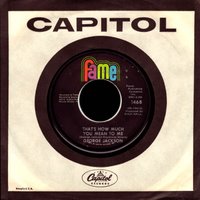 Fame was one of the studios that Claunch had been using off and on, ever since James Carr's earliest sides for Goldwax in 1964. He began sending Jackson down there as well, along with Spencer Wiggins and his brother Percy. They recorded some great material, but Claunch folded the label before it was released. Rick Hall wasted no time, and signed George up as the new staff songwriter at Fame in 1969. Rick also recorded him as an artist for the house label, and today's cool record is The B side of his first Fame single, Find 'Em, Fool 'Em, And Forget 'Em (now up on the A side). Recorded right around the time the 'second' rhythm section left, I'm not sure if it's them or the 'Fame Gang' backing him up, all I know is that it's great! Co-written with his new running partner Raymond Moore, George is at his best here spinning yet another tale of the vagaries of love. His next (and last) single for the label, That's How Much You Mean To Me, would result in his first chart appearance when it cracked the R&B top 50 in the summer of 1970. Hall had secured the rights to the unreleased Goldwax recordings at this point, and when he put out Spencer Wiggins' rendition of Jackson composition Double Lovin' later that year it broke the top 50 as well (Spencer's only chart hit).
Fame was one of the studios that Claunch had been using off and on, ever since James Carr's earliest sides for Goldwax in 1964. He began sending Jackson down there as well, along with Spencer Wiggins and his brother Percy. They recorded some great material, but Claunch folded the label before it was released. Rick Hall wasted no time, and signed George up as the new staff songwriter at Fame in 1969. Rick also recorded him as an artist for the house label, and today's cool record is The B side of his first Fame single, Find 'Em, Fool 'Em, And Forget 'Em (now up on the A side). Recorded right around the time the 'second' rhythm section left, I'm not sure if it's them or the 'Fame Gang' backing him up, all I know is that it's great! Co-written with his new running partner Raymond Moore, George is at his best here spinning yet another tale of the vagaries of love. His next (and last) single for the label, That's How Much You Mean To Me, would result in his first chart appearance when it cracked the R&B top 50 in the summer of 1970. Hall had secured the rights to the unreleased Goldwax recordings at this point, and when he put out Spencer Wiggins' rendition of Jackson composition Double Lovin' later that year it broke the top 50 as well (Spencer's only chart hit). 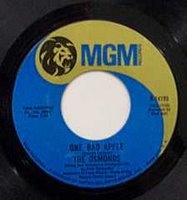 When MGM sent floundering boy band The Osmonds down to Fame in 1971, they took a song George had originally written with the Jackson 5 in mind, One Bad Apple, all the way to number one on the pop charts. The record would spend five weeks there, and become an international success (it even made #6 R&B!). The Osmonds were on top. Ironically, their follow-up single would be a cover of Double Lovin', which would make it to #14 pop (Wiggins' original hadn't even 'bubbled under' the Hot 100). MGM would release a George Jackon single on their Verve subsidiary, I Found What I Wanted, later that year, but nothing much came of it.
When MGM sent floundering boy band The Osmonds down to Fame in 1971, they took a song George had originally written with the Jackson 5 in mind, One Bad Apple, all the way to number one on the pop charts. The record would spend five weeks there, and become an international success (it even made #6 R&B!). The Osmonds were on top. Ironically, their follow-up single would be a cover of Double Lovin', which would make it to #14 pop (Wiggins' original hadn't even 'bubbled under' the Hot 100). MGM would release a George Jackon single on their Verve subsidiary, I Found What I Wanted, later that year, but nothing much came of it.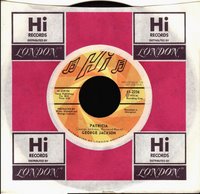 1972 saw George back in Memphis, working with Willie Mitchell at his Royal Studio. Top 40 R&B hit Aretha, Sing One For Me would become his second Hi release, and George's last chart entry. Another great record, Let Them Know You Care would follow in 1973, but it didn't sell. the B sides of both of these singles, I'm Gonna Wait and Patricia, respectively, are simply wonderful in their own right, and reflective of the phenomenal work that was going on at Royal in those days.
1972 saw George back in Memphis, working with Willie Mitchell at his Royal Studio. Top 40 R&B hit Aretha, Sing One For Me would become his second Hi release, and George's last chart entry. Another great record, Let Them Know You Care would follow in 1973, but it didn't sell. the B sides of both of these singles, I'm Gonna Wait and Patricia, respectively, are simply wonderful in their own right, and reflective of the phenomenal work that was going on at Royal in those days.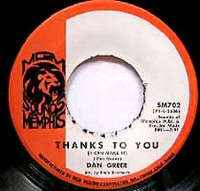 Although George's main focus remained on his songwriting (George Soulé's Get Involved and Clarence Carter's Too Weak To Fight are but two examples of the great work he was doing at the time), MGM continued to release singles on him through 1974. The company also backed a label he had formed with his old partner Dan Greer, Sounds Of Memphis. Back recording former Goldwax artists like The Ovations and Spencer Wiggins, they were producing some great music, but times had changed, and the records weren't selling. MGM promo man Eddie Ray believed in George's talent (even after his employer had moved on), and in addition to placing one single with Chess in 1975, he put out what many consider to be George's finest record, Talking About The Love I Have For You/I Don't Need You No More on his own ER label in 1976.
Although George's main focus remained on his songwriting (George Soulé's Get Involved and Clarence Carter's Too Weak To Fight are but two examples of the great work he was doing at the time), MGM continued to release singles on him through 1974. The company also backed a label he had formed with his old partner Dan Greer, Sounds Of Memphis. Back recording former Goldwax artists like The Ovations and Spencer Wiggins, they were producing some great music, but times had changed, and the records weren't selling. MGM promo man Eddie Ray believed in George's talent (even after his employer had moved on), and in addition to placing one single with Chess in 1975, he put out what many consider to be George's finest record, Talking About The Love I Have For You/I Don't Need You No More on his own ER label in 1976.By the late seventies, George had left Fame and began working with cross-town rivals Muscle Shoals Sound. There was one 'disco' single released on the studio's short lived record label, but the main work was going on behind the scenes. Unknown to the general public, Jackson was hunkered down with what may just have been the best band in the world recording demos of the songs he was writing. The resulting tapes became legendary, and remained unheard for over twenty years (more on that in a moment). His work from this period included blockbusters like Bob Seger's Old Time Rock & Roll in 1978, and James Brown's It's Too Funky In Here in '79.
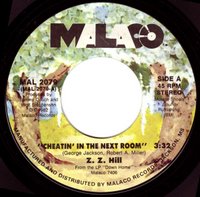 As we've mentioned before, Tommy Couch and Wolf Stephenson up at Malaco heard George's demos and selected a couple of tunes for their new signee Z.Z. Hill's second album, Down Home in 1981. Jackson composition Down Home Blues, which Malaco refused to release as a single, was just huge and helped make the record the largest selling 'blues' album in history. When they released George's Cheatin' In The Next Room as a single from the album in early 1982, it took off, spending five months on the R&B charts. On the basis of such unprecedented sales, Malaco hired Jackson as their new staff songwriter later that year. He still holds that position today, and has written countless fantastic songs for the label's soul stalwarts like Denise LaSalle, Little Milton, Bobby Bland and Johnnie Taylor (the Jackson penned Last Two Dollars was a gigantic hit in 1996, and helped make Taylor's album Good Love Malaco's biggest seller ever).
As we've mentioned before, Tommy Couch and Wolf Stephenson up at Malaco heard George's demos and selected a couple of tunes for their new signee Z.Z. Hill's second album, Down Home in 1981. Jackson composition Down Home Blues, which Malaco refused to release as a single, was just huge and helped make the record the largest selling 'blues' album in history. When they released George's Cheatin' In The Next Room as a single from the album in early 1982, it took off, spending five months on the R&B charts. On the basis of such unprecedented sales, Malaco hired Jackson as their new staff songwriter later that year. He still holds that position today, and has written countless fantastic songs for the label's soul stalwarts like Denise LaSalle, Little Milton, Bobby Bland and Johnnie Taylor (the Jackson penned Last Two Dollars was a gigantic hit in 1996, and helped make Taylor's album Good Love Malaco's biggest seller ever).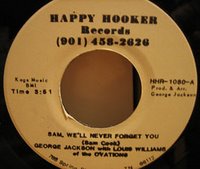 George himself hadn't recorded much in the eighties, except for a few singles on local southern labels like Crosstown and Washataw. He recorded a duet with old favorite Louis Williams for Happy Hooker in 1985, and did some work with good ol' Senator Jones, who had moved his Hep' Me operation to friendlier quarters in Jackson, Mississippi in the early nineties. The Hep' Me material has been made available again on a Black Grape CD, Heart To Heart Collect.
George himself hadn't recorded much in the eighties, except for a few singles on local southern labels like Crosstown and Washataw. He recorded a duet with old favorite Louis Williams for Happy Hooker in 1985, and did some work with good ol' Senator Jones, who had moved his Hep' Me operation to friendlier quarters in Jackson, Mississippi in the early nineties. The Hep' Me material has been made available again on a Black Grape CD, Heart To Heart Collect.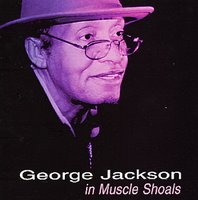 Malaco had bought Muscle Shoals Sound lock, stock and barrel in 1985. George's demo tapes were included in the sale along with hundreds of other items. When Grapevine Music became the UK licensee for Malaco around the turn of the century, they began an ambitious search of their 'vaults'. Finding Jackson's Muscle Shoals demos intact and sounding just as good as the day they were recorded must have been like finding the Holy Grail. They have released two excellent CDs of the material so far, and you should buy them. They are superb.
Malaco had bought Muscle Shoals Sound lock, stock and barrel in 1985. George's demo tapes were included in the sale along with hundreds of other items. When Grapevine Music became the UK licensee for Malaco around the turn of the century, they began an ambitious search of their 'vaults'. Finding Jackson's Muscle Shoals demos intact and sounding just as good as the day they were recorded must have been like finding the Holy Grail. They have released two excellent CDs of the material so far, and you should buy them. They are superb.George Jackson is truly a living legend, and one of the most 'unsung' of the heroes of southern soul. The BMI Reperoire database lists him as the writer or co-writer of 435 songs.
He's A Man And A Half.
May He Rest In Peace.
































